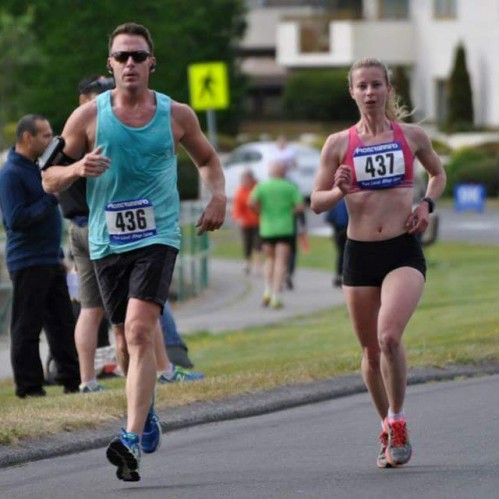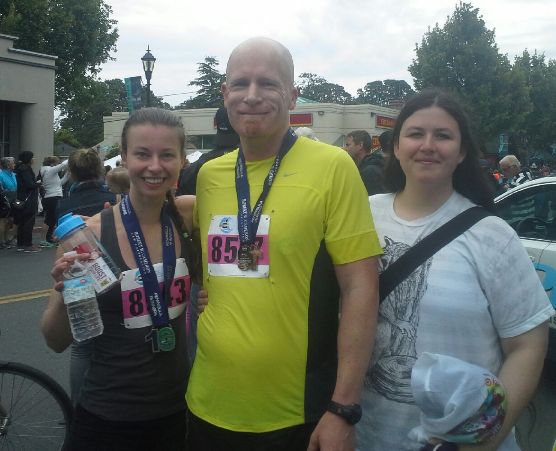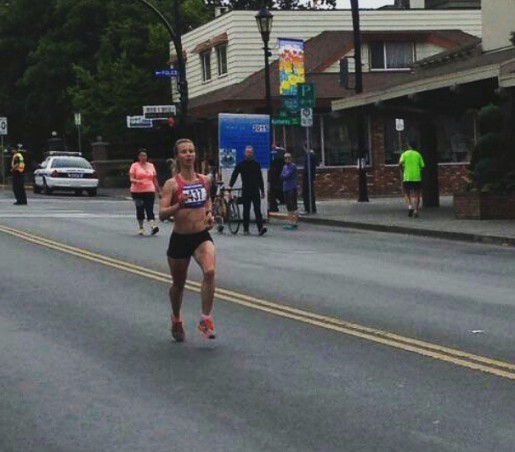The half marathon is a great distance for runners of all levels for a number of reasons. For newer runners, the half marathon represents a challenging yet rewarding feat that they can be proud of. If you have never ran a half marathon before, the thought of it may seem overwhelming.
If you have previously done 5k and 10k races, then the half marathon is a natural progression.
Below are 13 tips to help you run your first half marathon.
1.Set a realistic goal.
It’s great to have a time goal such as “finish under 2 hours” or “get under 1:45”. However, by the time you get to race day, you will have a generally good idea of what your training has been like.
If your training has gone well, then yes, by all means, go for that time. However, if life got in the way (which happens to everyone from time to time) and training didn’t go as well as you had hoped (which has happened to me a number of times these past couple of years), there is nothing wrong with easing off your time goal a bit.
Running a half marathon, regardless of how long it takes you, is an amazing accomplishment in itself. You are doing yourself a disservice if you are so hung up on your pace and time that you forget to enjoy the experience.

Here’s a pic from the Oak Bay Half Marathon in 2015. I got 1:32:xx that day. Do you notice anything interesting about this photo?
2.Don’t eat or drink anything new on race day.
If there is a food or drink that you haven’t tried before a run during your training, then it’s best to save it for after the race. I can think of many examples of races that didn’t go well for me because I ate or drank the wrong thing before the race.
Here is a list of some of the worst things to eat on race day (believe me, I would know!):
- Foods that are very high in fiber because too much fiber can lead to GI issues during your race, although it’s otherwise healthy for us
- Sugary foods and sweets because they will cause your blood sugar to spike and then crash
- Dairy products because some people have trouble digesting lactose as it is
- Excessively spicy foods because they can also cause GI issues during your race
- Protein bars because many of them are full of sugars
- Foods that are high in fats because fats take longer to digest and your stomach will feel uncomfortable
3.Prepare all your race gear the night before.
On race morning, you don’t want to be stressed out looking for your favorite pair of running shorts or wondering if your GPS watch has enough battery life left to last the whole race.
Therefore, you should fully charge your GPS watch the day before, if you feel you must have it for your race. You should also prepare your socks, underwear, shirt, shoes and shorts/pants the night before.
Ideally, you will have run in all this gear during your training so that you don’t get any surprises, such as chafing and blisters, during your race.
You also want to make sure that you have your bib and pins in an easily accessible place, ideally with the gear you chose for your race.
Your shoes should already be broken in at least a week or two before your race. That way, you will know for sure if your shoes will work for you during your race.
Blisters and chafing will make your run very uncomfortable and this is why it’s important to wear the right gear.
4.Learn the route.
You should take some time to examine the elevation profile (if there is one available) and the course map. It’s important to know where all the hills and turns are so that you can pace yourself accordingly.
For example, if you know that there is a hill within the last three miles, then you know that you need to save some energy for those last three miles.
If you get a chance, you should do some of your long runs leading up to your race on the race course. This will allow you to get a feel for what the course is like which will help alleviate some of the pre-race nervousness.
5.Try to get some friends to run with you.
Running is always fun with friends, especially if you are all working towards a new challenge together.
This is why joining run groups and taking part in run clinics leading up to your race can give you an advantage over other first-timers. When you take part in a run clinic, especially one that is designed for beginners, you will learn a lot about what it takes to run your first half marathon.
When you are running with people who have similar goals, you can encourage each other to keep going when the going gets tough.
If you are all aiming to complete the race in a specific time (such as 2 hours or 1:45, etc) then you can feed off of each other’s energy and positive vibes to get through it together.

Always grateful for friends to run with!
6.Emulate race day during your long training runs as much as possible.
For example, if you know what time your race starts, try to start your long run at that time. You can also practice your hydration and nutrition during your long runs.
This will allow you to learn what works and doesn’t work for your body. Depending on how long you think the half marathon will take you will determine how much race fuel you actually need.
You can experiment with that during your training runs to get a better idea of how long you think you will be out on the course.
7.Find out what kind of nutrition and hydration will be offered at aid stations during the race.
If you know what will be provided well in advance, you will have the opportunity to try it out during your training.
This will allow you to determine if you need to bring your own or if you can skip bringing your fuel belt and use what they have on the course.
During your long training run, try what they offer. You can buy whatever it is they offer at any running store and see how your body reacts to it during training. You may even be able to get some samples.
If it upsets your stomach, then at least you will know that you have to bring your own stuff.
However, if it works for your body, then you can save yourself the stress of having to figure out how much you need to bring to fuel your run.
8.Plan your pre-race logistics.
If you are driving down to the race venue, you will need to figure out road closures and parking. Then, you will also need to figure out where you are going to store your keys.
Sometimes, roads close well before the start of the race so you need to get there early enough so that you can find a parking spot close to where the race starts.
If you are taking public transit, you will need to leave some room for potential minor delays. You will also need to get on early enough to give yourself time to walk to the start. Additionally, you will need to figure out where to get off the bus so that you don’t end up having to walk more than you need to.
You will also need to confirm if the race you are doing offers gear check. If they do, then you need to get there early enough to get in line to be able to use the gear check and still make it to the start line on time.
You should also find an alternative place for your most valuable items because with hundreds (or even thousands) of runners out there, it is very challenging for volunteers and event staff to keep track of everyone’s valuables.
Even though people in the running community are generally trustworthy (again, just my experience), there is never a 100% guarantee that your wallet or cell-phone won’t be lost if you put them in the gear check. In my opinion, I don’t think it’s fair to hold race staff and volunteers accountable for your valuables.
There are a lot of things that race staff and volunteers have to keep track of on race day and while they do their very best to ensure nothing bad happens to your stuff, there is always a chance that something can potentially get lost because of how much stuff there is.
9.Don’t compare your time to anyone else’s.
Look:
Just because your friend ran her first half marathon under two hours, doesn’t mean that you should hyper-focus on trying to do that too.
Everyone’s journey to the start line and reason for running is very different and we all need to recognize that.
Comparing yourself to other people doesn’t do you any good. While a little friendly competition is OK and can be fun, you must not beat yourself up if your time is slower than your friend’s.
When you compare yourself to other people, you end up spending a lot of mental energy that is better spent focusing on executing the perfect race plan.
Yes, even if you are running your first half marathon, you should still try to have a race plan. Having a race plan will prevent you from getting distracted by what everyone else is doing.
10.Seed yourself appropriately.
Most races allow participants to line up at the start line based their own predicted finish time. The elite runners line up at the front and the walkers line up at the back. Everyone else, more or less, ends up in the middle with faster runners lining up closer to the front and slower runners end up closer to the back.
Predicting how fast you think you will run when you have never raced a particular distance before can be tricky.
If you have recently raced a 10k or 10 miles, then there are a number of calculators available online that can help you predict your approximate half marathon time.
The reason why it’s important to seed yourself appropriately is because if you start with people that are substantially faster than you, then you may be tempted to start your race too fast. If you start your race too fast, we already know that bad things can happen.
However, if you start with a group that is significantly slower than you, then you end up getting held back. Furthermore, you end up having to dodge a bunch of people who run slower than you, which ultimately causes you to slow down.
If you are running a half marathon for the first time and you don’t expect to win your age group, then you should err on the side of caution and line up slightly further back, but not too far back. This will keep you from busting out of the gate and you can always pass people in the second half of the race.
11.Enjoy the experience and be thankful for it.
We often get so hung up on our pace and time that we forget to enjoy the experience. When you line up at the start line, you should try to focus on having fun.
I know that 21.1km (or 13.1 miles) is an uncharted territory for many runners but that is exactly why this experience as a whole is so special.
I ran my first ever half marathon in 2:12.
Do you really think that taking longer than 2 hours upset me? Absolutely not!
When I crossed the finish line, I was grateful for the opportunity. I was grateful that my body was healthy enough to do it. Not only that, but I was also extremely happy with the friends that I made along the way.
The fact that I took over two hours to run my first marathon didn’t take away from my personal feelings of accomplishment.
I tried to take in every moment and I was proud of every step I took to reach the finish line and you should, too.

Approaching the finish at the Oak Bay Half Marathon in 2015.
12.Take mental notes of how the race goes for you.
Your first half marathon is a great opportunity for you to learn more about yourself as a runner. During your first half marathon, you will learn what racing techniques work, or don’t work, for you.
Furthermore, you will be able to assess if you made the right choices with your nutrition and hydration. Trust me, your body WILL let you know.
Once you finish your first half marathon, you should be able to recall how you felt during different parts of the race.
When you are finished the race and you get a moment to sit down and relax, ask yourself the following 10 questions and use your answers as the starting points for the next training cycle:
- What did I eat leading up to the race?
- Was I hydrated enough?
- Did I dress appropriately for the weather?
- Did I feel overheated or too cold?
- Did I stop at every aid station or did I skip some and how did I feel during the race?
- Did I over-hydrate and feel uncomfortable as a result?
- Did I start too fast (or too slow)?
- How much energy (if any) do I feel I had left at the end?
- Was there any point during the race that surprised me and why?
- Was there anything that I think I could have done better (and differently)?
Keep in mind that the 10 questions should lead you towards a better race next time provided that you are very honest with yourself. It’s good to try to get as many insights into your race as possible.
There are a number of other questions you can ask yourself about how your first half marathon went for you, but for the sake of simplicity, we won’t get into it this time.
13.Take time to properly recover after your race.
Recovery is crucial to both training and racing well. First, give yourself a huge pat on the back for completing your first half marathon.
Running 20+km is not easy no matter how fast you do it and you deserve to feel good about yourself for doing it.
Not only that, but you also deserve some rest and relaxation.
After all, you ran a half marathon and you should celebrate it! Treat yourself to a massage, get acupuncture, eat some of your favorite foods, order your favorite drink, hang out with your friends and family, and watch your favorite movie.
Most importantly though, don’t jump back into a hard training cycle immediately after you finish your first half marathon. Your body needs approximately one day of recovery for every mile raced. Since the half marathon is 13 miles, you will need about 13 days to recover.
While recovery is important, it doesn’t mean that you should just sit all day every day for two weeks doing nothing.
I typically take 4 days off from running after a hard half marathon and a little over a week after running a marathon. Once you take your initial few days off running, you can do some easy jogging for 20-40 minutes depending on how your body is feeling. If you don’t have any pain or injuries, you can definitely do some easy runs within the first 13 days after your half marathon.
Final thoughts about running your first half marathon:
If you are looking for a fun half marathon to do, you should sign up for the Oak Bay Half Marathon. The Oak Bay Half Marathon offers a non-intimidating environment for first timers. It features beautiful views and a great atmosphere.
The Oak Bay Half Marathon is definitely coming up quick.
However, if you don’t quite feel ready for the half marathon, then they also offer a 10k and a half marathon relay. You can do the 10k this time around and then run the half next year, after you’ve had time to execute a progressive and effective endurance training plan. Or, grab a few running buddies or coworkers and do the half marathon relay.
The Oak Bay Half marathon also welcomes walkers and beginners. So, don’t be nervous about your time and I hope to see you there!
I hope that these tips for your first half marathon were useful. Please share this with anyone who you think would benefit from these tips.
Thank you for reading and an even bigger thank you for sharing!
What a great read !!! It eases my mind a bit the way you break it down into really enjoying the moment and to be as little overwhelmed with the events as possible, take time to prepare, take time to enjoy, take time to do it safely without injury. Im 56 yrs old and am loving getting out and meeting others who enjoy doing the same thing, Ive found this sport takes me to different places to see different things while being fit. This is great advice for someone like me doing their first 1/2 marathon and Im sure I will be referring to it often during my training. Thanks for posting.. happy running 🏃♂️